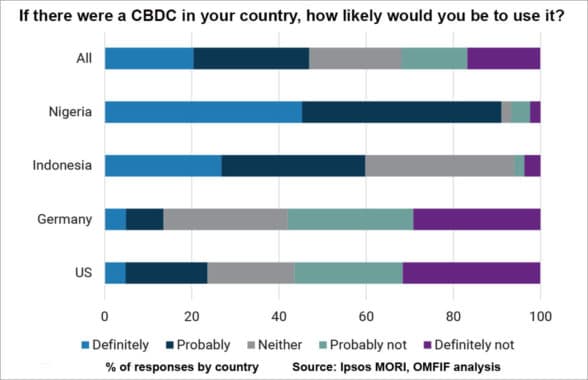
More than nine in 10 consumers in Nigeria (91%) and six in 10 consumers in Indonesia (60%) would be likely to use a central bank digital currency (CBDC) compared with less than 24% in the US and 14% in Germany, according to a report by Giesecke+Devrient and the Official Monetary and Financial Institutions Forum (OMFIF).
In addition to “a sharp difference in attitudes” towards CBDCs, the research also reveals that awareness of digital currencies varies between emerging and developed markets, with 40% of consumers in both Nigeria and Indonesia saying they are “familiar with the concept of CBDCs” compared with just under 20% in Germany and 15% in the US.
“Consumers who say they would be prepared to use CBDCs see a wide range of potential uses, as a complement to payment apps, cards, mobile wallets and cash, as well as a tool for financial inclusion,” the researchers say.
“Emerging market consumers see a considerable number of use cases for CBDC, far more than their counterparts in developed markets.
“More than 50% of respondents in Nigeria and Indonesia would consider using CBDC as a form of payment in digital marketplaces, and more than 40% would use them for shopping at merchants, peer-to-peer payments, to store money digitally or to allow family member to pay for them for items without having a bank account.
“Only around 40% of consumers in developed markets would be likely to use CBDC for any purpose, most likely shopping and P2P payments.”
Digital issues
“Concerns that CBDC might not have widespread acceptance is the biggest overall issue consumers have with digital currencies,” the researchers add.
“The fear that spending habits will be tracked is a bigger issue in emerging markets than developed markets. Security is a significant issue in all jurisdictions, but more so in the US and Nigeria. Complexity is not a major concern.”
The report also shows, however, that 33% of respondents say they believe that CBDCs can address concerns with security and 29% that CBDCs could address issues regarding universality.
“What consumers seem to want from digital currencies — once they have been educated about them, a core message for both the public and private sectors — is universal acceptance, privacy, security and ease of use,” the researchers say.
The research published in the ‘Consumer attitudes to CBDC: Considerations for policy-makers’ report is based on a survey of 3,000 consumers — 1,000 each in the US and Germany and 500 each in Indonesia and Nigeria in August and September this year.
The CBDC global index 2021 published by PwC in April showed that retail CBDC projects are “particularly strong” in emerging economies.
Next: Visit the NFCW Expo to find new suppliers and solutions